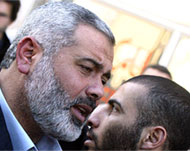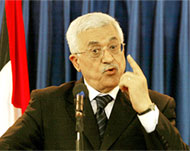Entered into the database on Thursday, January 26th, 2006 @ 16:46:19 MST
The Islamic group Hamas has won a huge majority in parliamentary elections
as Palestinian voters rejected the long-time rule of the Fatah Party. Of the 132 seats in Parliament, Hamas won 76 and Fatah 43, the election commission
announced on Thursday. Palestinian Prime Minister Ahmed Qureia and his Cabinet resigned, even before
the official results were announced, and Palestinian leader Mahmoud Abbas was
to ask Hamas to form the next government. The top Hamas leader, Khaled Mashaal, told Abbas his group is ready for a political
partnership, Hamas said. And in a first sign of pragmatism, Mahmoud Zahar, a top Hamas official, said
the group would extend its year-old truce if Israel reciprocates. "If not,
then I think we will have no option but to protect our people and our land,"
he said. Loyal opposition Fatah legislator Saeb Erekat said the party does not want to join a Hamas government.
"We will be a loyal opposition and rebuild the party," Erekat said,
after meeting Abbas. But Nabil Shaath, another senior Fatah lawmaker, said the party's leadership
would make a decision later on Thursday. Abbas was elected separately a year ago and remains president. However, the Palestinian
leader has said he would resign if he could no longer pursue his peace agenda. The Cabinet and legislature must approve any major initiative by Abbas, giving
Hamas tremendous influence over peace moves. Hamas supporters streamed into the streets to celebrate. In the southern Gaza town of Rafah, supporters shot in the air and handed out
candy. Others honked horns and waved Hamas flags from car windows. Hamas capitalized on widespread discontent with years of Fatah corruption and
ineffectiveness. Much of its campaign focused on internal Palestinian issues,
while playing down the conflict with Israel. Mixed signals Before the election, Hamas had suggested it would be content as a junior partner
in the next government, thus avoiding a decision on its relationship with Israel.
Throughout the campaign, leaders sent mixed signals, hinting they could be open
to some sort of accommodation with Israel. Its apparent victory will now force
it to take a clearer position on key issues. Mushir al-Masri, a Hamas candidate who won election in the northern Gaza Strip,
said peace talks and recognition of Israel are "not on our agenda"
but the group is ready for a partnership - presumably with Abbas. Some Hamas officials tried to reassure the world of its intentions. "Don't be afraid," Ismail Haniyeh, a Hamas leader, told the BBC.
"Hamas is a Palestinian movement, it is an aware and mature movement, one
which is politically open in the Palestinian arena, and to its Arab and Islamic
hinterland, and similarly open to the international arena." This was the first time Hamas has contested a parliamentary vote. Half the seats in Wednesday's parliament vote were chosen on a national list
and the other half by districts. Advantage Hamas apparently took advantage of divisions in Fatah; the long-ruling party
fielded multiple candidates in many districts, splitting the Fatah vote. Palestinian legislator Hanan Ashrawi, who apparently was re-elected on a moderate
platform, said the Hamas victory was a dramatic turning point. She said she is
concerned the fighters will now impose their fundamentalist social agenda and
lead the Palestinians into international isolation. She said Fatah's corruption, Israel's tough measures and international indifference
to the plight of the Palestinians were to blame for Hamas's strong showing.
Turnout for Wednesday's vote was heavy, with nearly 78% of 1.3 million eligible
voters casting ballots. The polling stations were heavily guarded, and there
were no reports of major violence. What's next: _ Final results results are to be certified within twoweeks. During that
time, participants may challenge results. _ After final results are in, Mahmoud Abbas, the president of the Palestinian
Authority, begins consultations with factions that are to enter the next
parliament, then will tap a party to put together a government. That party
will have three weeks to put together a government, and can ask for a
two-week extension. _ The new Palestinian parliament is to be sworn in for a four-year term
in March. _ Abbas, elected last year to a four-year term, can remain in office.
He has said he would step down if he cannot push forward efforts to seek
a peace deal with Israel.

